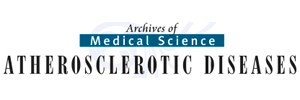CLINICAL RESEARCH
Association of ficolin-2 (FCN2) functional polymorphisms and protein levels with rheumatic fever and rheumatic heart disease: relationship with cardiac function
Submission date: 2018-04-25
Final revision date: 2018-09-15
Acceptance date: 2018-10-04
Publication date: 2018-12-15
Arch Med Sci Atheroscler Dis 2018;3(1):142-155
KEYWORDS
polymorphismRheumatic heart diseaseRheumatic feverL-ficolin (ficolin-2)FCN2 generheumatic feverrheumatic heart disease
TOPICS
ABSTRACT
Introduction:
A role for ficolin (FCN) 2 gene polymorphisms in the pathogenesis of recurrent severe streptococcal infections and rheumatic carditis has been suggested. The aim of the study was to evaluate a possible relationship between single nucleotide polymorphisms located at positions -602 and -4 of the FCN2 gene and FCN2 serum levels and risk of development of rheumatic fever (RF) and rheumatic heart disease (RHD).
Material and methods:
Seventy-seven Caucasian Egyptian patients with RF were recruited with a control group of 43 healthy subjects. DNA was extracted for analysis of the FCN2 gene at positions -602 and -4 and serum protein level was measured by ELISA.
Results:
FCN2 AA genotype at the -4 position was more frequently observed in RF and RHD patients, as compared to healthy subjects (p = 0.005 and p = 0.013, respectively); furthermore, the A allele was identified as a possible risk factor for the development of RF (p = 0.023, OR = 1.852, 95% CI: 1.085–3.159). The haplotype –602/–4 G/A, which was associated with low median levels of L-ficolin, was observed more frequently in the RF group when compared to the healthy subjects (74/162, 48.1% vs. 29/420, 33.7%, OR = 1.834, 95% CI: 1·034–3.252, p = 0·038). Low serum ficolin 2 level was associated with ESV and EDV increases. FCN 2 level was significantly lower with AA genotypes than GG+AG genotypes of the -4 position (56.68 ±17.90 vs. 66.05 ±18.79, p = 0.008).
Conclusions:
Polymorphisms linked to low levels of L-ficolin may render an individual at risk of recurrent and/or severe streptococcal infection. The -4 AA genotype and -602/-4 G/A haplotype are possible risk factors for the development of carditis.
A role for ficolin (FCN) 2 gene polymorphisms in the pathogenesis of recurrent severe streptococcal infections and rheumatic carditis has been suggested. The aim of the study was to evaluate a possible relationship between single nucleotide polymorphisms located at positions -602 and -4 of the FCN2 gene and FCN2 serum levels and risk of development of rheumatic fever (RF) and rheumatic heart disease (RHD).
Material and methods:
Seventy-seven Caucasian Egyptian patients with RF were recruited with a control group of 43 healthy subjects. DNA was extracted for analysis of the FCN2 gene at positions -602 and -4 and serum protein level was measured by ELISA.
Results:
FCN2 AA genotype at the -4 position was more frequently observed in RF and RHD patients, as compared to healthy subjects (p = 0.005 and p = 0.013, respectively); furthermore, the A allele was identified as a possible risk factor for the development of RF (p = 0.023, OR = 1.852, 95% CI: 1.085–3.159). The haplotype –602/–4 G/A, which was associated with low median levels of L-ficolin, was observed more frequently in the RF group when compared to the healthy subjects (74/162, 48.1% vs. 29/420, 33.7%, OR = 1.834, 95% CI: 1·034–3.252, p = 0·038). Low serum ficolin 2 level was associated with ESV and EDV increases. FCN 2 level was significantly lower with AA genotypes than GG+AG genotypes of the -4 position (56.68 ±17.90 vs. 66.05 ±18.79, p = 0.008).
Conclusions:
Polymorphisms linked to low levels of L-ficolin may render an individual at risk of recurrent and/or severe streptococcal infection. The -4 AA genotype and -602/-4 G/A haplotype are possible risk factors for the development of carditis.
We process personal data collected when visiting the website. The function of obtaining information about users and their behavior is carried out by voluntarily entered information in forms and saving cookies in end devices. Data, including cookies, are used to provide services, improve the user experience and to analyze the traffic in accordance with the Privacy policy. Data are also collected and processed by Google Analytics tool (more).
You can change cookies settings in your browser. Restricted use of cookies in the browser configuration may affect some functionalities of the website.
You can change cookies settings in your browser. Restricted use of cookies in the browser configuration may affect some functionalities of the website.


